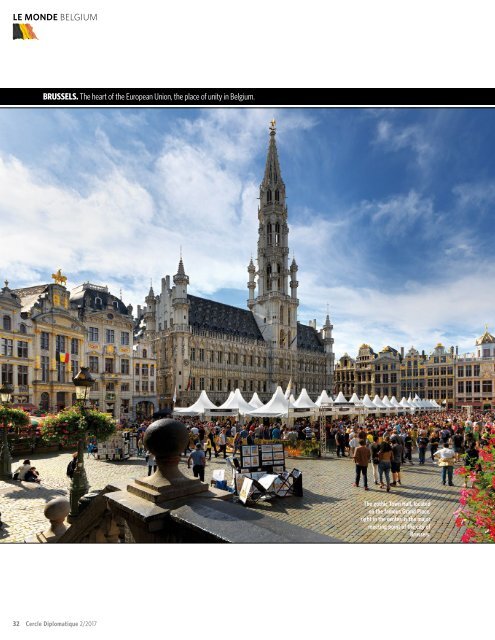CERCLE DIPLOMATIQUE - issue 02/2017
CD is a bi-lingual, independent and impartial magazine and is the medium of communication between foreign representatives of international and UN-organisations based in Vienna and the Austrian political classes, business, culture and tourism. CD features up-to-date information about and for the diplomatic corps, international organisations, society, politics, business, tourism, fashion and culture. Furthermore CD introduces the new ambassadors in Austria and informs about designations, awards and top-events. Interviews with leading personalities, country reports from all over the world and the presentation of Austria as a host country complement the wide range oft he magazine.
CD is a bi-lingual, independent and impartial magazine and is the medium of communication between foreign representatives of international and UN-organisations based in Vienna and the Austrian political classes, business, culture and tourism. CD features up-to-date information about and for the diplomatic corps, international organisations, society, politics, business, tourism, fashion and culture. Furthermore CD introduces the new ambassadors in Austria and informs about designations, awards and top-events. Interviews with leading personalities, country reports from all over the world and the presentation of Austria as a host country complement the wide range oft he magazine.
Create successful ePaper yourself
Turn your PDF publications into a flip-book with our unique Google optimized e-Paper software.
LE MONDE BELGIUM<br />
One of the famous chocolate<br />
shops (right) and a modern<br />
installation in the center, both in<br />
Brussels (below).<br />
BRUSSELS. The heart of the European Union, the place of unity in Belgium.<br />
The gothic Town Hall, located<br />
on the famous Grand Place,<br />
right in the center, is the major<br />
meeting point of the city of<br />
Brussels.<br />
PHOTOS: VISITFLANDERS.COM, SMETS PREMIUM STORE, MILO PROFI, JEAN-PAUL REMY<br />
There is a world record held by the Kingdom of<br />
Belgium, but for most of the Belgians this is<br />
not their favourite smalltalk topic. Its story<br />
goes back to the second last Parliamentary elections<br />
in Belgium, on June 13th, 2010. During the legislative<br />
period before, the country already had seen nearly<br />
four years of political crisis. One government after<br />
the other had offered its resignation to the then King<br />
Albert, some only after a few months in office.<br />
But the elections of 2010 – in which the nationalist<br />
New Flemish Alliance became the largest party in<br />
Flanders, and the Socialist Party PS the largest in<br />
Wallonia – resulted in total gridlock. All negotiations<br />
for a new government lead to no results. Not a<br />
single consensus could be achieved, and the country<br />
was run by a caretaker government until December<br />
2011, when a new government was sworn in. Already<br />
by March 30th, 2011, this set a new world record<br />
for the elapsed time without an official government,<br />
previously held by war-torn Iraq.<br />
”Well“, says Willem Van de Voorde, Ambassador<br />
of the Kingdom of Belgium to Austria in an eye-opening<br />
interview with “Cercle Diplomatique“, ”we have<br />
a tradition of long government formations and that<br />
was probably a record.“<br />
Visitors travelling the country in the months before<br />
the 2010 elections, must have experienced<br />
two Belgiums. The one Belgium, beloved by millions<br />
of tourists who enjoy driving from prosperous village<br />
to prosperous village, where the houses are solid without<br />
being grand, tidy but somehow higgledy-piggledy,<br />
ordinary, with a touch of the surreal. ”The people<br />
on the streets are neither aggressively neat, like the<br />
Dutch, nor self-consciously elegant, like the French“,<br />
a report of the British ”Guardian” reads. ”They are something<br />
in between. They are triumphantly and typically<br />
Belgian.“<br />
The other Belgium showed a picture of a divided<br />
nation. In the French-speaking villages, every second<br />
house had a red, yellow and black tricolour flag,<br />
draped at a window or flying from its roof. And the<br />
householders were making a self-conscious political<br />
statement: ”We are Belgians and we want to remain<br />
Belgians.“ But as soon as one entered an officially<br />
Dutch-speaking village, the Belgian tricolours almost<br />
vanished and no such proclamation was to be heard.<br />
All road signs there are in Dutch (or in English), what<br />
was an “Avenue“ in the last village, becomes a “laan“<br />
in the next, “rue“ becomes “straat“, and a “deviation“<br />
A fisheye‘s view on the European<br />
Parliament building in Brussels<br />
(above). The St. Michael and<br />
Gudula Cathedral (right) is named<br />
after the patron saints of<br />
Belgium.<br />
Building complex at the National<br />
Corporation KazMunaiGas<br />
Round Square.<br />
32<br />
Cercle Diplomatique 2/<strong>2017</strong><br />
Cercle Diplomatique 2/<strong>2017</strong><br />
31

















